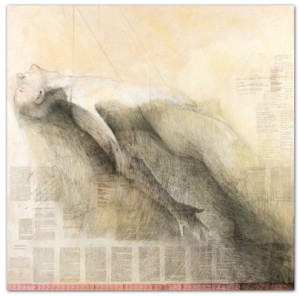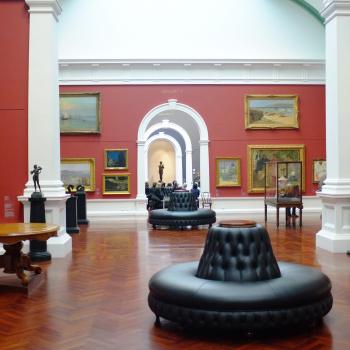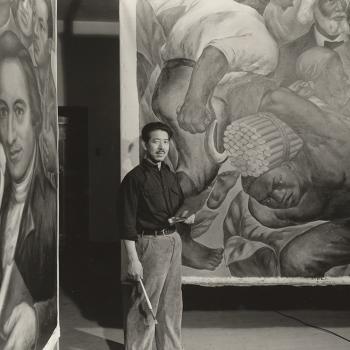
Guest Post by Stuart Scadron-Wattles
Read Gregory Wolfe’s part 1 post here.
The irony of the theme that Greg Wolfe had chosen for the Glen East 2013 conference (“Art and Risk”) was part of the silence between us, as we sat, glumly, opposite one another in two heavy armchairs, pondering our options.
Outside, a heavy rain was falling. Greg was rolling an unlit cigar between his fingers, never a good sign.
Image had risked an alliance with commerce, and it was about to cost us $65,000.
In my experience, the relationship between art and commerce is at best a one-sided affair, no matter how experienced the partners. Art is always the one risking its heart and getting it broken. Commerce walks away, counting the dollars snatched from the nightstand.
The events of the last few months had proved the point.
Late last year, Image engaged a reputable and experienced online company with both high- and low-profile clients to process our Glen conference registrations. They offered us a deal that they regularly offer to small non-profits who use their service. If we used their merchant account to clear our payments, they would issue us a check every two weeks and take their set-up fees out of our income, thus avoiding any up-front costs.
Everything went well—for about three months. Then the checks they sent us started to be returned by our bank, for insufficient funds. Not all of them “bounced”; just the large ones, and not all of the time.
The online company with a twelve-year track record was having cash flow problems, of course. They assured us that they were going to fix them. But the more people registered for the Glen, the fewer checks we saw, and the amount owed to us was mounting up.
We took preemptive action, and demanded that they switch the credit card fee handling to our own merchant account, so that (after they took their mutually consensual fee), the registration monies would go directly into our bank account. By this point, they were holding some $65,000 of our money, which they were promising to repay.
Then we found out that we were not alone. (You can go to http://www.actevasucks.info for corroborating evidence.) It became clear that we were not the only small not for profit being taken for a negative cash flow ride. There were at least 66 others, according to the Better Business Bureau website. (The figure has now risen to 96 complaints.)
Greg’s and my meeting in the middle of the Glen was to ponder advice we had received earlier that day from two intrepid Image board members. The next day we acted on it, asking each registrant whose fees we had not received to help us get our money back.
They did this by going to their credit card providers and convincing them that Acteva, the company in question, had not delivered the service that they promised. On that basis, the credit card providers would go to Acteva, get the funds back, credit the registrant, who would pay us (again), out of the refund.
It worked…to an extent.
Many writers and artists spent hours on the phone with bankers and trying to remember how to use fax machines. I regret to say that a number of trees gave their lives to the cause, through the filing of much paper, for that is the stuff of which these efforts are made.
I myself had to turn from raising money for Image—both my vocation and my profession here—to keeping track of how to get our legitimately earned income back into our bank account, where it belongs.
We’ve been partially successful: To date, our Glen East and West communities managed to rake back over $26,000. There’s another $4,900 in process that may be on its way back to us via the same route. The bank actions spooked the online company into getting us $10,000 of what they owed us, after which we heard nothing about any further repayments. (Except the complaint that the slew of bank actions made it difficult for them to calculate what they actually owed us.)
We are the only non-profit we know who has fought back against Acteva, and it would not have been possible except for the triumph of a community of artists, and its willingness to use the credit card system for its own just ends.
The Glen registrants were as angry as we were; they had not just registered for a conference, they had joined a community—and considered themselves to have been defrauded as well.
Meanwhile, the caterers and colleges and providers of services for the Glen are firmly and insistently asking that we honor our contracts with them, as they have every right to do. Only we are out of cash. The fundraising campaign and the Glen registrations are what keep us afloat in the summer.
And we’re sinking. All because we chose the wrong commercial partner, someone who has no self-interest in our well-being or survival.
That’s why we are asking our friends to help us keep the Glen alive. We have set a goal of $25,000 to cover this gap.
Here’s the link where you can help us.
The Glen attendees showed us that they consider Image to be worth fighting for. Will you join them?
Stuart Scadron-Wattles has written his way through music, professional theatre, and intentional Christian community. He currently lives with his wife Linda and extended family in Seattle, WA, where he serves as director of resource development for Image.
Art above: Erica Grimm-Vance. On the Question of Being III. 60” x 60′.’ Graphite, ECG Readings, and Encaustic on Birch. Text from Rilke, Heidegger, and Derrida.











